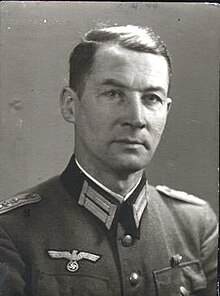
Back ويلم هوسنفيلد ARZ Vilm Hosenfild Azerbaijani Вільгельм Хозенфельд Byelorussian Вилхелм Хозенфелд Bulgarian Wilm Hosenfeld Catalan Wilm Hosenfeld Czech Wilm Hosenfeld German Βιλμ Χόζενφελτ Greek Wilm Hosenfeld Spanish ویلم هزنفلد Persian
Wilhelm Hosenfeld | |
|---|---|
 Hosenfeld in 1939 | |
| Birth name | Wilhelm Adalbert Hosenfeld |
| Born | 2 May 1895 Hünfeld, Hesse-Nassau, Prussia, German Empire |
| Died | 13 August 1952 (aged 57) Stalingrad, Russian SFSR, Soviet Union |
| Allegiance | |
| Branch | |
| Years of service | 1914–1917 1939–1945 |
| Rank | Hauptmann |
| Unit | Guard Battalion 660 |
| Battles / wars | |
| Awards | Order of Polonia Restituta (posthumous) Righteous Among the Nations Iron Cross |
Wilhelm Adalbert Hosenfeld (German pronunciation: [ˈvɪl(hɛl)m ˈhoːzənfɛlt]; 2 May 1895 – 13 August 1952), originally a school teacher, was a German Army officer who by the end of the Second World War had risen to the rank of Hauptmann (captain). He helped to hide or rescue several Polish people, including Jews, in Nazi-German occupied Poland, and helped Jewish pianist and composer Władysław Szpilman to survive, hidden, in the ruins of Warsaw during the last months of 1944, an act which was portrayed in the 2002 film The Pianist. He was taken prisoner by the Red Army and died in Soviet captivity in 1952.
In October 2007, Hosenfeld was posthumously honoured by Lech Kaczyński, the President of Poland, with a Commander's Cross of the Order of Polonia Restituta. In June 2009, Hosenfeld was posthumously recognized by Yad Vashem (Israel's official memorial to the victims of the Holocaust) as one of the Righteous Among the Nations.